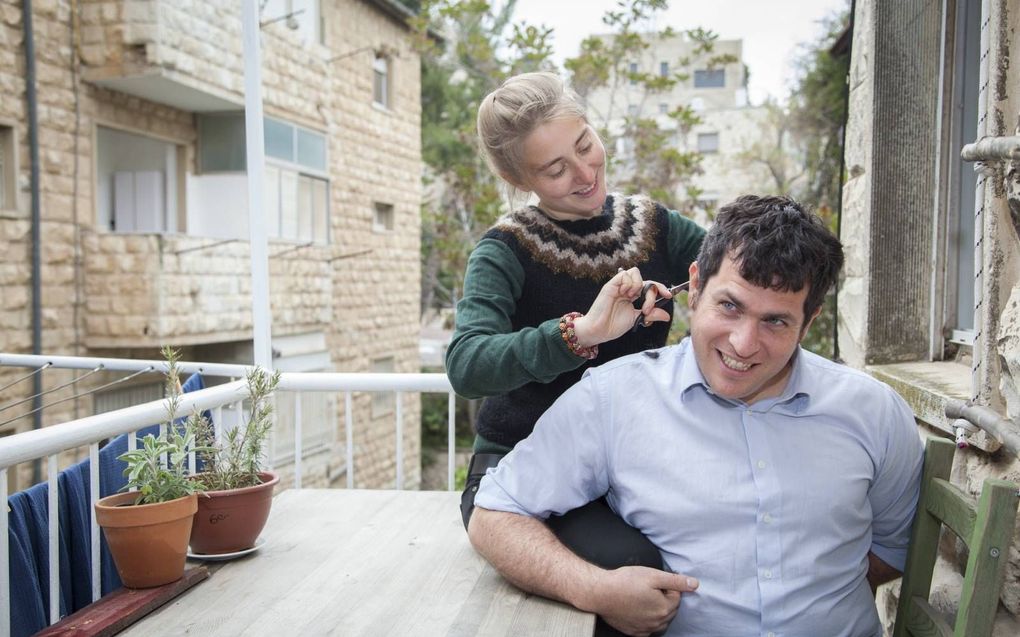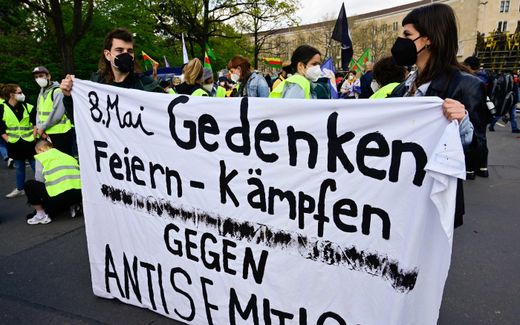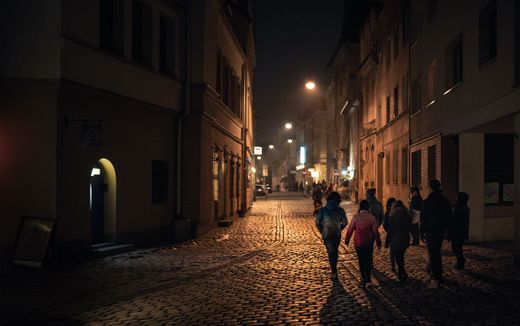Young Israelis study in Berlin; and stay there for love
15-01-2022
Central Europe
René Zeeman, RD

A young Germany lady is cutting the hair of her Israeli partner. Photo Katja Harbi
Central Europe
There are living about 25,000 Israelis in Germany. “Most are young, highly educated and have no intention of staying. But if they find a German partner, their residence becomes permanent.”
Prof. Dr Dani Kranz states –via a Zoom call– that the group of Israeli immigrants in Germany is small. “If you look at the number of Turks, about 3 million, there are not many Israelis. There are even more Palestinians. There are between 30,000 and 60,000 people in Berlin alone who call themselves Palestinians.”
Kranz is temporarily affiliated with the Ben-Gurion University of the Negev in Beersheba as an anthropologist. Her research areas are migration and ethnicity. For the University of Wuppertal, she conducted the first study on Israelis in Germany a few years ago, entitled “Israeli migration to Germany since 1990”.
How did you come up with this research?
“During my 2009 PhD research on liberal Jews in Cologne, I discovered Israelis in Germany. When I later wanted to research it, I first had to get money. Initially, no one wanted to make money available. In Germany, people were curious but at the same time cautious.
Moreover, when it comes to the Jews, universities in Germany are mainly focused on their past. People are less interested in the current community. That changed when the media noticed in the early 21st century that there were Israelis in Germany. The Israelis in Germany then became an unavoidable political fact. That’s how it works with politics. After that, I could get to work on my research.”
Which Israelis are coming to Germany?
“These are mainly young Israelis. The Israelis who go to Germany are generally left-wing or moderate-left, secular and highly educated. The career opportunities in Germany are much better. And in many cases, as secular Jews, they find the role of Orthodox Jews in public life in Israel too oppressive.”

And then they mainly go to Berlin?
“That is correct. Berlin has the most appeal. That’s just the appeal of a big city. Young Israelis do not go to Berlin for other reasons than young Americans or young Dutch.
When Israelis have completed their education, they do not always leave. Many find a German partner during their studies, and then it can just happen that they stay in Germany.” Kranz estimates that about half of the Israelis in Germany are married to a German.
How is the reaction in Israel to their departure?
“People are not so happy there. They hope they come back.”
Because Germany is the land of the Shoah?
“That is still a thing that comes to mind, although people are more neutral towards Germany. For those who go to Germany, that does not count at all.”
How do the Germans react to the arrival of the Israelis?
“The Germans have certain expectations of Israelis. Israelis would all be religious and behave accordingly. The young Israelis who come to Germany often do not, however. They rarely go to synagogue on Friday evenings but are with their family. In addition, German or Russian is spoken in the synagogues, which Israelis rarely do, if at all.
This pattern of expectations is particularly noticeable in the German remembrance culture. Israelis are expected to participate in the war commemorations. The Jews who survived the war in Germany have adapted and are participating in these ceremonies. They were few and had no choice.”
Back to Germany
While most Jews left Germany after World War II, Irene Kaufmann’s father returned.
Kaufmann (66) is the daughter of Ernst Rosenberg (1914-2008), who came into contact with National Socialism in the early 1930s. “My father studied law at the Friedrich-Wilhelm-Universität in Berlin, later Humboldt University of Berlin. He was a member of the Jewish student association Sprevia. He regularly witnessed how National Socialist students attacked and chased Jewish students at the university building entrance. A police officer then taught him and other Jewish students self-defence.”

Rosenberg’s emigration in 1933 was at the initiative of his father. “He was a city architect in Berlin but lost his job when Adolf Hitler came to power in 1933.” Because his father was worried about the future, he sent his son Ernst to Palestine, then British Mandate territory. “A year later, my grandfather and grandmother went after him.”
After Ernst’s father died, his wife decided to return to Germany. “She didn’t speak Hebrew, and that didn’t make it easy for her to settle in. She went to live in Düsseldorf, near former friends.”
A year later, your father went back?
“Yes, his mother, my grandmother, had become ill and asked if he wanted to come back. He did not want to leave her alone, so he moved to Germany with his wife. When my grandmother died in 1955, they stayed.”
Your mother did not mind going back to Germany?
“She was born in Palestine but never complained. In Germany, she went to teach Hebrew. In 1962 she interpreted at the Treblinka trial for the witnesses from Israel.”
Your father was a detective and discovered that several colleagues had made mistakes during the war. How was that for him?
“My father didn’t know exactly who had misbehaved. He never spoke about it.”
Has he never regretted returning?
“That was not a theme at home.”
Did you never consider emigrating to Israel?
“Yes, when I was about seventeen. But I chose Germany and committed myself to the Jews. I became active in Primary. Together with Josef Schuster, who is now chairman of the Central Council for the Jews in Germany, I founded the Bund jüdischer Jugend. Later I became a member of the board of the Hochschule für jüdische Studien in Heidelberg.”
Culture of remembrance
According to Kranz, a specific culture of remembrance has arisen in this way. “The Germans believe that the Jews like to mourn and commemorate with the Germans. But that’s a wrong assumption. In principle, Jews do not mourn or commemorate in public but in a family setting. On the other hand, Germans mourn in public and not with their families.”
The young Israelis have nothing to do with these commemorations. According to Kranz, they come from a majority culture and say: “We are not participating in that.”
Jews from the former Soviet Union have absolutely nothing to do with these commemorations. Kranz: “They cry: “We are not victims of fascism; we have been victorious.”
According to studies, anti-Semitism is on the rise. How do you see that?
“Anti-Semitism in the Federal Republic is structural. But what is seen above all as a threat is the anti-Semitism of the streets. You see that when a group of people stands in front of a synagogue and starts chanting things like “Scheissjuden” or “gas for Jews”. That is more likely to be observed.
At the same time, structural anti-Semitism feeds street anti-Semitism. So, if the problem is not tackled structurally, the problem will remain on the street. Colleagues of mine who are trying to fight anti-Semitism in ministries are frustrated because they get little done. The most frightening thing is doing nothing. Then you have reactions: It has always been like this. It’s not that bad after all.”
What about Islamic anti-Semitism?
“You have anti-Semites among Muslim citizens. You also have Islamists with strong anti-Israel views. By the way, I would not argue that they are more anti-Semitic or anti-Israel than Germans. People from the Arab world have heard nothing but: “Israel is evil” and “Israel is the devil”. At the same time, it is not certain that all citizens believe this.
This does not alter the fact that there is Islamic anti-Semitism due to the arrival of the guest workers. At the same time, Germany does not need a guest worker to have anti-Semitism.”
This article was translated by CNE.news and was previously published in Dutch daily Reformatorisch Dagblad on December 7th, 2021.
Related Articles





